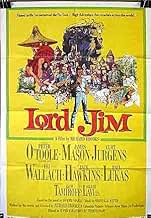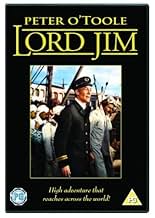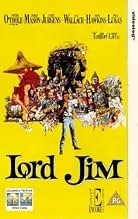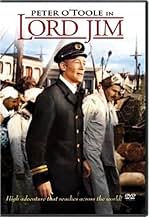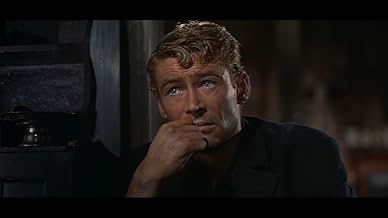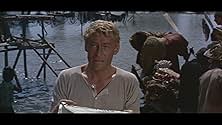CALIFICACIÓN DE IMDb
6.7/10
4.3 k
TU CALIFICACIÓN
Después de ser desacreditado como cobarde, un marinero del siglo XIX vive con un solo propósito: redimirse.Después de ser desacreditado como cobarde, un marinero del siglo XIX vive con un solo propósito: redimirse.Después de ser desacreditado como cobarde, un marinero del siglo XIX vive con un solo propósito: redimirse.
- Nominada a2premios BAFTA
- 2 nominaciones en total
Curd Jürgens
- Cornelius
- (as Curt Jurgens)
Jûzô Itami
- Waris
- (as Ichizo Itami)
Rafiq Anwar
- Moslem Leader
- (as Rafik Anwar)
- Dirección
- Guionistas
- Todo el elenco y el equipo
- Producción, taquilla y más en IMDbPro
Argumento
¿Sabías que…?
- TriviaThe crew and cast were joined by Cambodian translator Dith Pran, who was a liaison between Cambodians and the filmmakers and stars. He left the country after the 1975 Communist takeover and his own imprisonment, and his story was told in Los gritos del silencio (1984).
- ErroresWhen Jim is going up river, one of his companions throws a knife into another's back, but the knife is already in his back as he turns to warn Jim.
- ConexionesFeatured in My Favorite Year (1982)
Opinión destacada
I have seen the film three times over the past thirty years and each time I loved it. The subject of the film must have attracted director Richard Brooks who was essentially a screenplay writer who later became a director. He knew the merits of a strong script with philosophical lines from Conrad. Coppola was to use the related original material (Conrad's) in his "Apocalypse Now" for the Brando scenes several decades after this film was made and mostly forgotten.
What Brooks does not realize is that lines like "it only takes a split second to make a coward a hero or turn a hero into a coward" and "every sinner wants a second chance at redemption, without realizing he is damned for ever" are philosophical lines that one expects to hear from very literate individuals. Here, in "Lord Jim," the lines are often spoken by the dregs of society. Jim, of course, we are told by the narrator (Jack Hawkins' Marlowe) was philosophical, dreamed of heroism, and was a gentleman.
The film is made up of three distinct segments: 1. the "sinking" of SS Patna 2. The liberation of Patusan ("Patna" + "us" make up the name Patusan, remarks Jim to his love) and 3. The battle with a group of scoundrels (led by James Mason's 'Gentleman' Brown) with some fine speeches on honor, death, and fear.
Each segment could stand alone but together the film adds considerable worthiness that exceeds the action and plot, the elements that most viewers use to judge a movie. The lesser characters in the film add color and counterpoints to the script. Christian Marquand's French Captain who defends Jim's "cowardice" with the words "fear can make us do strange things" or Paul Lukas' Stern who compares his dead butterfly collection with the "wonderful, perfect human beings that God created" or the native who wonders why some pray to one god instead of a host of Gods are a few examples of dialogs that force you to reflect on what you heard.
The film's subject covers several religions. The fervent Muslims on the way to Haj survive the storm. The Christian Jim prays to his God. The Buddhists pray to Buddha. And the natives pray to their array of gods (a touch of Hinduism?). Yet, the film is not a religious film. But faith in God is underlined at every stage.
Conrad was Polish and a seaman before he became a writer. Brooks is an American. O'Toole leads a cast that is predominantly British. Daliah Lavi is Israeli, Marquand is French, Jurgens is German...The film is truly international.
Brooks not only wrote and directed the film but this was the first film that he produced. The film proved to be ideal for O'Toole reprising his roles of "Lawrence of Arabia" and "Becket", roles that draw thin lines between cowardice and heroism and consequent attempts to redeem oneself. The film is not great cinema--but will remain for me cinema based on related major literary works ("Lord Jim" and "Heart of Darkness", both narrated by the fictional Marlow) adapted for the screen with some delightful performances from O'Toole, Mason, Wallach, and Marquand and commendable photography by Freddie Young.
What Brooks does not realize is that lines like "it only takes a split second to make a coward a hero or turn a hero into a coward" and "every sinner wants a second chance at redemption, without realizing he is damned for ever" are philosophical lines that one expects to hear from very literate individuals. Here, in "Lord Jim," the lines are often spoken by the dregs of society. Jim, of course, we are told by the narrator (Jack Hawkins' Marlowe) was philosophical, dreamed of heroism, and was a gentleman.
The film is made up of three distinct segments: 1. the "sinking" of SS Patna 2. The liberation of Patusan ("Patna" + "us" make up the name Patusan, remarks Jim to his love) and 3. The battle with a group of scoundrels (led by James Mason's 'Gentleman' Brown) with some fine speeches on honor, death, and fear.
Each segment could stand alone but together the film adds considerable worthiness that exceeds the action and plot, the elements that most viewers use to judge a movie. The lesser characters in the film add color and counterpoints to the script. Christian Marquand's French Captain who defends Jim's "cowardice" with the words "fear can make us do strange things" or Paul Lukas' Stern who compares his dead butterfly collection with the "wonderful, perfect human beings that God created" or the native who wonders why some pray to one god instead of a host of Gods are a few examples of dialogs that force you to reflect on what you heard.
The film's subject covers several religions. The fervent Muslims on the way to Haj survive the storm. The Christian Jim prays to his God. The Buddhists pray to Buddha. And the natives pray to their array of gods (a touch of Hinduism?). Yet, the film is not a religious film. But faith in God is underlined at every stage.
Conrad was Polish and a seaman before he became a writer. Brooks is an American. O'Toole leads a cast that is predominantly British. Daliah Lavi is Israeli, Marquand is French, Jurgens is German...The film is truly international.
Brooks not only wrote and directed the film but this was the first film that he produced. The film proved to be ideal for O'Toole reprising his roles of "Lawrence of Arabia" and "Becket", roles that draw thin lines between cowardice and heroism and consequent attempts to redeem oneself. The film is not great cinema--but will remain for me cinema based on related major literary works ("Lord Jim" and "Heart of Darkness", both narrated by the fictional Marlow) adapted for the screen with some delightful performances from O'Toole, Mason, Wallach, and Marquand and commendable photography by Freddie Young.
- JuguAbraham
- 9 mar 2006
- Enlace permanente
Selecciones populares
Inicia sesión para calificar y agrega a la lista de videos para obtener recomendaciones personalizadas
- How long is Lord Jim?Con tecnología de Alexa
Detalles
- Tiempo de ejecución2 horas 34 minutos
- Relación de aspecto
- 2.20 : 1
Contribuir a esta página
Sugiere una edición o agrega el contenido que falta

Principales brechas de datos
By what name was Lord Jim (1965) officially released in India in English?
Responda


